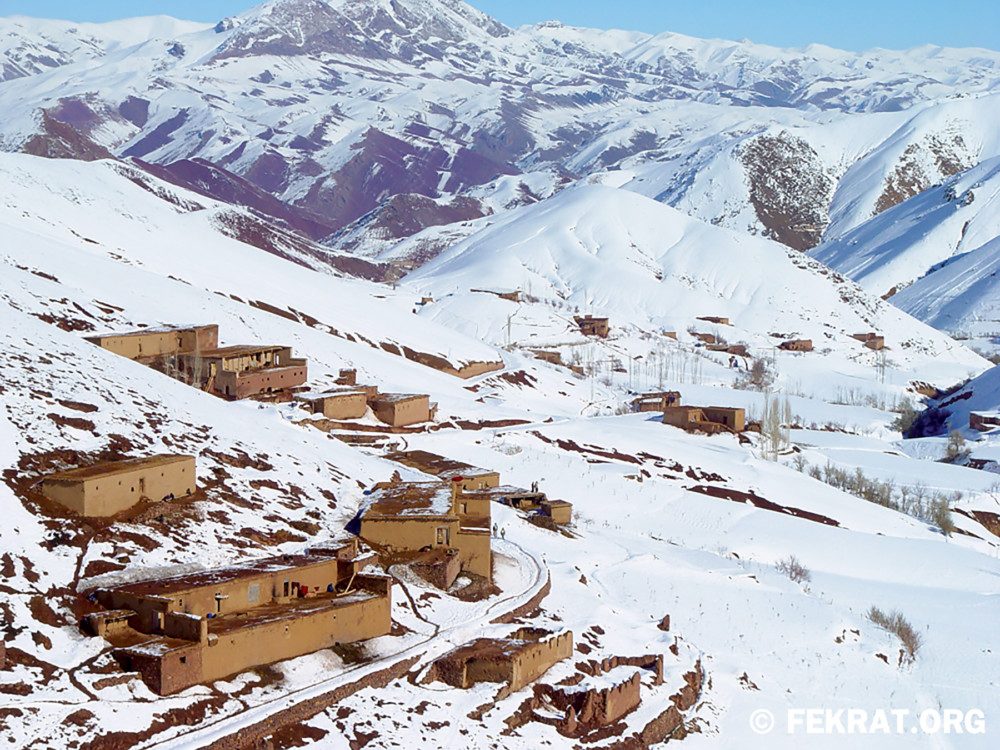Hinges creak on the worn wooden door as I push it and rapidly enter our small mud-brick home followed closely by my younger sister; both of us hurry as if blown in by the icy gale. Happy to finally find shelter from the snow falling quickly from the dark-grey late-afternoon sky, we both adjust our colorful embroidered and beaded head scarves and straighten our bright green and red floral dresses. Our mother and grandmother’s handiwork of heavy stockings and fur-lined boots has kept our legs and feet warm during the long walk home from my little sister’s school.
The icy flakes tap against the small kitchen window, reminding us of the fragile barrier between the darkness, the cold – and us. Our kitchen is the warmest room in the house, and where we not only eat but also sleep during the winter months. Mother sits in the center of the kitchen on a wool rug stirring a pot of steaming hot fava beans on the little stove. She’s already preparing our supper and I join her by readying the dough for the fried bread. Father will be home soon. My sister settles down with her notebooks and concentrates on the last of her homework; tomorrow will be her final day of classes until springtime.
She and I have been fortunate to learn to read and write. My people have traditionally valued the education and leadership of both men and women, but that opportunity was denied my mother because of militants who seized power over my people. A well of sadness rises in my heart that I try to squelch. I remember that when I was school age, my parents fled with us in order to escape from such people. Those who stayed risked violence and death. We left our homeland and joined tens of thousands taking refuge in a neighboring country. But we received a cold welcome there: discrimination abounded and some of our people were targeted by militants and killed.
After the collapse of the extremists, we returned to settle in our own capital city, feeling it was safer. However, because our people are despised by the majority group of our country, my father had to work as a poorly paid laborer. Later we returned to our home region and rebuilt our lives here. Father works very hard. At the best of times, our wheat and barley stores are just enough and our few goats and sheep meet our needs, but in the long winter it is common for us to go short and not eat properly. It is rugged here and we struggle to live in these conditions. The snow isolates us almost completely for several months. Yet, when there is not enough snow to irrigate the land, we are stretched for adequate food and water.
I love our beautiful region and long for peace in our country. However, recent violent events are reminders that our people are still a minority and discrimination ever lurks. Some have left again, seeking refuge even further afield in East Asia, Europe and Australia.
The Milaz people are in urgent need of basic health training and care, appropriate technology, clean water, and adequate educational opportunities for both boys and girls. Above all, they need to know and follow Jesus. As few as 0.03% of the population are believers. There are opportunities to serve the Milaz people, but those involved (mainly medical and humanitarian in nature) are doing so under extreme difficulties. There are no official Good News Ambassadors working among this people group in their home country.
*A pseudonym to protect the identity of these people
Pray for the Milaz
- Ask the Lord of the harvest to call and send people who are willing to share Christ among the Milaz people in both word and life. May God call people with various skills (medical, appropriate technology, construction, agriculturists, water specialists, teachers and literacy workers, etc.) to help the Milaz find solutions to their needs.
- Ask God to open the hearts of Milaz people to trust in the One who values them and gives them an eternal hope.
- Ask God to protect his people among the Milaz, to grow them as disciples, and to help them find opportunities to safely meet as the Body of Christ.
- Ask the Lord to lead Christians to reach out to Milaz people who have sought refuge in other countries.
